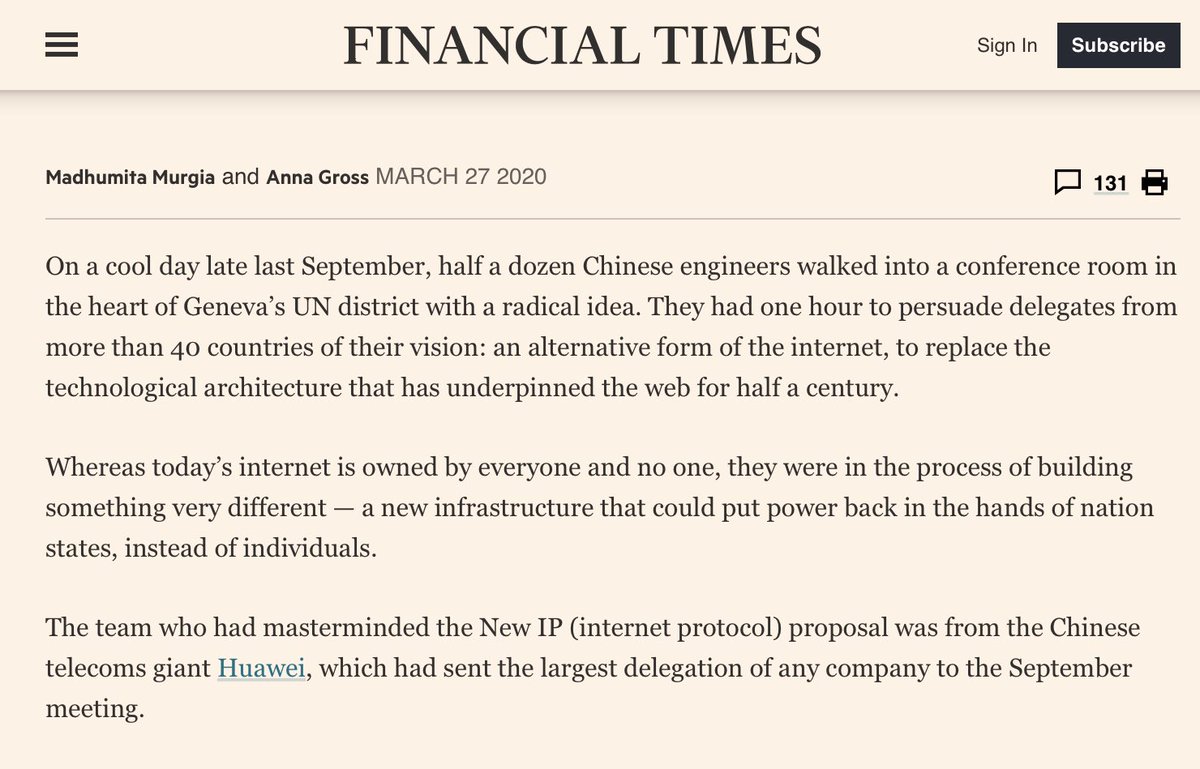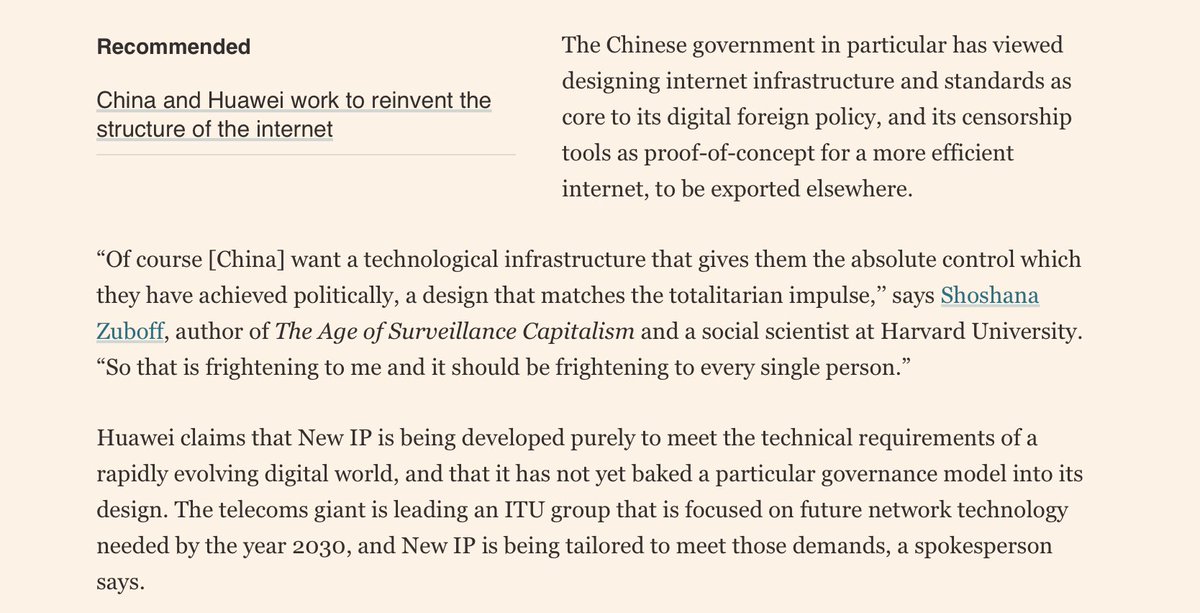I’m surprised I hadn’t seen this story on my timeline before yesterday. The original FT report by @madhumita29 and Anna Gross is also worth reading in full, but seems worth sharing a few snippets to hopefully induce a few of you to click through.
https://www.ft.com/content/ba94c2bc-6e27-11ea-9bca-bf503995cd6f?shareType=nongift (1/14) https://twitter.com/campuscodi/status/1253423723446583297
https://www.ft.com/content/ba94c2bc-6e27-11ea-9bca-bf503995cd6f?shareType=nongift (1/14) https://twitter.com/campuscodi/status/1253423723446583297
ITU is a UN agency that establishes / ratifies common global technology standards.
In September the Chinese delegation (Huawei engineers) pitched ITU on New IP: top-down, centralized internet that puts power back in the hands of nation states instead of individuals. (2/14)
In September the Chinese delegation (Huawei engineers) pitched ITU on New IP: top-down, centralized internet that puts power back in the hands of nation states instead of individuals. (2/14)
The implication for the end users is that the state could control access not only to content on the network, but also access of a device to the network. (3/14)
The path to this newer, better internet is infrastructure.
Huawei says it “has not yet baked a particular governance model into its design” - it’s just anticipating the demands of 2030 based on findings from an ITU study group that it also happens to lead. (4/14)
Huawei says it “has not yet baked a particular governance model into its design” - it’s just anticipating the demands of 2030 based on findings from an ITU study group that it also happens to lead. (4/14)
While governance (allegedly) isn’t baked in yet, construction of the new network is already under way, “built by engineers from industry and academia across multiple countries” who go unnamed because of commercial sensitivities. (5/14)
Despite being based on the anticipated demands of 2030 it’ll be ready to test by next year and they will be trying to convince ITU delegations to adopt it and officially standardize it within a year at a conference scheduled for November in Italy. (6/14)
If ITU delegates reach a consensus “based loosely on majority agreement” New IP will be officially standardized.
If not, it goes “to a closed-door vote in which only member countries can participate, cutting out the views of industry and civil society.” (7/14)
If not, it goes “to a closed-door vote in which only member countries can participate, cutting out the views of industry and civil society.” (7/14)
The authors don’t speculate on results of a closed door vote but they do note that “Beijing’s ambitions to build more controls are not seen as a problem by everybody - merely as the next chapter in its evolution.” (8/14)
They give several examples, including the head of ITU’s study groups that develop / ratify technical standards says its not his place to judge whether proposals are ripe for misuse. (9/14)
Nothing would force a country to adopt the New IP, and I’m not by any means trying to imply that the US or most of the West would.
But I think many Americans, myself included, often take our freedoms for granted. What of the rest of the world? (10/14)
But I think many Americans, myself included, often take our freedoms for granted. What of the rest of the world? (10/14)
Unsurprisingly, Iran, Russia and Saudi Arabia supported earlier alternative network concepts China has proposed.
16 countries have signed MOUs with China for advanced IT infrastructure (aka the Digital Silk Road) and Huawei has 91 contracts to provide 5G equipment. (11/14)
16 countries have signed MOUs with China for advanced IT infrastructure (aka the Digital Silk Road) and Huawei has 91 contracts to provide 5G equipment. (11/14)
Look at @AlinejadMasih’s timeline and #WhiteWednesdays-women bravely persisting in a nonviolent grassroots campaign for change, an inspiring movement that’d be throttled instantly if the government could prevent their phones from connecting to the network. (12/14) https://twitter.com/AlinejadMasih/status/1187028849068007426
Consider the WHO’s response to the emerging pandemic and ask yourself whether other improbable but avoidable fiascos might be brewing because we collectively ignore the policies of UN agencies until they actually impact our lives directly. (13/14)
Again, it’s worth reading the article in full. (14/14) https://twitter.com/lionelbarber/status/1244165490869710848

 Read on Twitter
Read on Twitter





